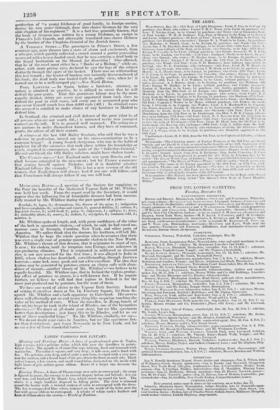MEDICATED BATHS.—A meeting of the Society for supplying to the
Poor the benefits of the Medicated Vapour Bath of Mr. Whitlinv was held last week. From the report read by the Secretary, it would appear that the following list of formidable diseases had been success- fully treated by Mr. Whitlow during the past quarter of a year— Scrofula, 9; lepra, 3; rheumatism, 13; disease of the spine, 1 ; indigestion and liver complaints, 6; seirrhus and cancer, 3; general debility, 2; asthma, 9; lip-joint disease, 2; scald head, 2; palsy, 3; ringworm, 1; epilepsy, I ; fever, 3; unhealthy ulcers, 3; scurvy, 2; rickets, I; erysipelas, 6; common cold, 5; miatica, 5.
Mr. Whitlow spoke at length, and, with great confidence, of the value or the bath in spasmodic cholera,—of which, he said, he had cured nu- merous cases in Georgia, Carolina, New York, and other parts of America. We rather think that the doctors, his brethren, will tell Mr. -Whitlow that he begs the whole question when he assumes that there was ever a single case of genuine spasmodic cholera in the New World. lIr. Whitlow's theory of that disease, that it originates in ergot of rye, is new ; for cholera, until its irruption into Europe, was unknown in rye-producing climates. That it originated in mildewed or diseased rice, is not now asserted for the first time ; it was alleged in India in 1817, .where cholera has flourished, notwithstanding, through fourteen harvests—some bad, some good, and not a few excellent. The idea that tyldnis may be generated by potatoes grown on clayey soils with abun- dance of manure--another theory of Mr. Whitlaw's—we believe to be equally fanciful. Mr. Whitlow says, that in Ireland the typhus-produc- ing effect of potatoes so grown, is a well-known fact. If he inquire further, we believe he will find that typhus in Ireland is for the most part produced not by potatoes, but the want of them.
We have one word of advice to the Vapour Bath Society. Instead of setting themselves down at No. 14, Finsbury Square, let them de- spatch Mr. Whitlow and a bath apparatus to Gateshead. His success there will effectually put an end to any thing like suspicion touching the value of his method of cure. When the traveller, in lEsop, boasts of the mighty leaps he took in the island of Rhodes, one of the bystanders observes—" We don't at all doubt your story, but we like specimens Letter than descriptions : just fancy this to be Rhodes, and let us see one of these wonderful leaps." To Mr. Whitlow, similarly, we say- 4' We do not doubt your cures in America, but we like specimens bet- ter than descriptions : just fancy Newcastle to be New York, and let its see a few of these wonderful cures."


















































 Previous page
Previous page